Deck 13: Exponential and Logarithmic Functions
Question
Question
Question
Question
Question
Question
Question
Question
Question
Question
Question
Question
Question
Question
Question
Question
Question
Question
Question
Question
Question
Question
Question
Question
Question
Question
Question
Question
Question
Question
Question
Question
Question
Question
Question
Question
Question
Question
Question
Question
Question
Question
Question
Question
Question
Question
Question
Question
Question
Question
Question
Question
Question
Question
Question
Question
Question
Question
Question
Question
Question
Question
Question
Question
Question
Question
Question
Question
Question
Question
Question
Question
Question
Question
Question
Question
Question
Question
Question
Question

Unlock Deck
Sign up to unlock the cards in this deck!
Unlock Deck
Unlock Deck
1/229
Play
Full screen (f)
Deck 13: Exponential and Logarithmic Functions
1
For the given functions f and g , find the indicated value.

A) 31
B) 286
C) -3
D) 320

A) 31
B) 286
C) -3
D) 320
320
2
Determine whether the function is a one-to-one function.

A) Yes
B) No

A) Yes
B) No
No
3
Determine whether the function is a one-to-one function.

A) Yes
B) No

A) Yes
B) No
No
4
For the given functions f and g , find the indicated value.

A)
B)
C)
D)

A)

B)

C)

D)


Unlock Deck
Unlock for access to all 229 flashcards in this deck.
Unlock Deck
k this deck
5
For the given functions f and g , find the indicated composition.

A) x
B) x + 16
C) 4x + 24
D) x - 2

A) x
B) x + 16
C) 4x + 24
D) x - 2

Unlock Deck
Unlock for access to all 229 flashcards in this deck.
Unlock Deck
k this deck
6
For the given functions f and g , find the indicated value.

A) 45
B) 280
C) 91
D) 43

A) 45
B) 280
C) 91
D) 43

Unlock Deck
Unlock for access to all 229 flashcards in this deck.
Unlock Deck
k this deck
7
For the given functions f and g , find the indicated value.

A) 53
B) 203
C) 26
D) 46

A) 53
B) 203
C) 26
D) 46

Unlock Deck
Unlock for access to all 229 flashcards in this deck.
Unlock Deck
k this deck
8
For the given functions f and g , find the indicated value.

A) 91
B)
C) 0
D) 43

A) 91
B)

C) 0
D) 43

Unlock Deck
Unlock for access to all 229 flashcards in this deck.
Unlock Deck
k this deck
9
For the given functions f and g , find the indicated composition.

A)
B)
C)
D)

A)

B)

C)

D)


Unlock Deck
Unlock for access to all 229 flashcards in this deck.
Unlock Deck
k this deck
10
Determine whether the function is a one-to-one function.
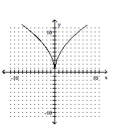
A) Yes
B) No

A) Yes
B) No

Unlock Deck
Unlock for access to all 229 flashcards in this deck.
Unlock Deck
k this deck
11
Determine whether the function is a one-to-one function.
{(6, 9), (7, 9), (8, -4), (9, 9)}
A) Yes
B) No
{(6, 9), (7, 9), (8, -4), (9, 9)}
A) Yes
B) No

Unlock Deck
Unlock for access to all 229 flashcards in this deck.
Unlock Deck
k this deck
12
For the given functions f and g , find the indicated composition.


A)
B)
C)
D)


A)

B)

C)

D)


Unlock Deck
Unlock for access to all 229 flashcards in this deck.
Unlock Deck
k this deck
13
Determine whether the function is a one-to-one function.

A) Yes
B) No

A) Yes
B) No

Unlock Deck
Unlock for access to all 229 flashcards in this deck.
Unlock Deck
k this deck
14
For the given functions f and g , find the indicated composition.
f(x) = 8x + 5, g(x) = 2x - 1
A) 16x + 13
B) 16x + 4
C) 16x - 3
D) 16x + 9
f(x) = 8x + 5, g(x) = 2x - 1

A) 16x + 13
B) 16x + 4
C) 16x - 3
D) 16x + 9

Unlock Deck
Unlock for access to all 229 flashcards in this deck.
Unlock Deck
k this deck
15
For the given functions f and g , find the indicated composition.
f(x) = -2x + 4, g(x) = 5x + 5
A) -10x + 25
B) -10x - 15
C) -10x + 14
D) 10x + 25
f(x) = -2x + 4, g(x) = 5x + 5

A) -10x + 25
B) -10x - 15
C) -10x + 14
D) 10x + 25

Unlock Deck
Unlock for access to all 229 flashcards in this deck.
Unlock Deck
k this deck
16
For the given functions f and g , find the indicated composition.

A)
B)
C)
D)

A)

B)

C)

D)


Unlock Deck
Unlock for access to all 229 flashcards in this deck.
Unlock Deck
k this deck
17
For the given functions f and g , find the indicated composition.

A)
B)
C)
D)

A)

B)

C)

D)


Unlock Deck
Unlock for access to all 229 flashcards in this deck.
Unlock Deck
k this deck
18
Determine whether the function is a one-to-one function.
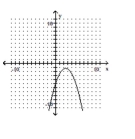
A) Yes
B) No

A) Yes
B) No

Unlock Deck
Unlock for access to all 229 flashcards in this deck.
Unlock Deck
k this deck
19
Determine whether the function is a one-to-one function.
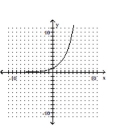
A) Yes
B) No

A) Yes
B) No

Unlock Deck
Unlock for access to all 229 flashcards in this deck.
Unlock Deck
k this deck
20
Determine whether the function is a one-to-one function.
{(6, 6), (13, 7), (11, 8), (9, 9)}
A) Yes
B) No
{(6, 6), (13, 7), (11, 8), (9, 9)}
A) Yes
B) No

Unlock Deck
Unlock for access to all 229 flashcards in this deck.
Unlock Deck
k this deck
21
Determine whether the function is a one-to-one function.

A) Yes
B) No

A) Yes
B) No

Unlock Deck
Unlock for access to all 229 flashcards in this deck.
Unlock Deck
k this deck
22
A one-to-one function f is given. Find f-1(x) and graph f(x) with a solid line and f-1(x) with a dotted line on the same
axes.
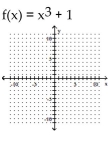
A)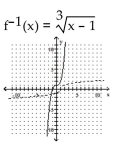
B)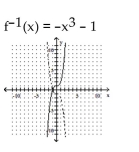
C)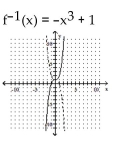
D)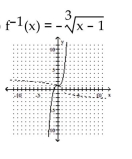
axes.

A)

B)

C)

D)


Unlock Deck
Unlock for access to all 229 flashcards in this deck.
Unlock Deck
k this deck
23
Determine whether the function is a one-to-one function.

A) Yes
B) No

A) Yes
B) No

Unlock Deck
Unlock for access to all 229 flashcards in this deck.
Unlock Deck
k this deck
24
Determine whether the given function is one-to-one. If it is one-to-one, find its inverse function.

A)
B)
C) 3
3
D) not a one-to-one function

A)

B)

C)
 3
3D) not a one-to-one function

Unlock Deck
Unlock for access to all 229 flashcards in this deck.
Unlock Deck
k this deck
25
Determine whether the function is a one-to-one function.

A) Yes
B) No

A) Yes
B) No

Unlock Deck
Unlock for access to all 229 flashcards in this deck.
Unlock Deck
k this deck
26
For the given function, find the domain and range of both f(x) and f-1(x).
{(6, -11), (-1, -10), (-3, -9), (-5, -8)}
A)
B)
C)
D)
{(6, -11), (-1, -10), (-3, -9), (-5, -8)}
A)

B)

C)

D)


Unlock Deck
Unlock for access to all 229 flashcards in this deck.
Unlock Deck
k this deck
27
Determine whether the function is a one-to-one function.

A) Yes
B) No

A) Yes
B) No

Unlock Deck
Unlock for access to all 229 flashcards in this deck.
Unlock Deck
k this deck
28
Determine whether the given function is one-to-one. If it is one-to-one, find its inverse function.

A)
B)
C)
D) not a one-to-one function

A)

B)

C)

D) not a one-to-one function

Unlock Deck
Unlock for access to all 229 flashcards in this deck.
Unlock Deck
k this deck
29
Determine whether the function is a one-to-one function.

A) Yes
B) No

A) Yes
B) No

Unlock Deck
Unlock for access to all 229 flashcards in this deck.
Unlock Deck
k this deck
30
Determine whether the given function is one-to-one. If it is one-to-one, find its inverse function.

A)
B)
C)
D) not a one-to-one function

A)

B)

C)

D) not a one-to-one function

Unlock Deck
Unlock for access to all 229 flashcards in this deck.
Unlock Deck
k this deck
31
For the given function, find the domain and range of both f(x) and f-1(x).
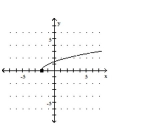
A)
B)
C)
D)

A)

B)

C)

D)


Unlock Deck
Unlock for access to all 229 flashcards in this deck.
Unlock Deck
k this deck
32
Determine whether the given function is one-to-one. If it is one-to-one, find its inverse function.

A)
B)
C)
D) not a one-to-one function

A)

B)

C)

D) not a one-to-one function

Unlock Deck
Unlock for access to all 229 flashcards in this deck.
Unlock Deck
k this deck
33
A one-to-one function f is given. Find f-1(x) and graph f(x) with a solid line and f-1(x) with a dotted line on the same
axes.
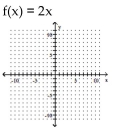
A)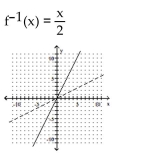
B)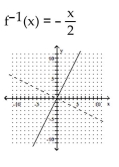
C)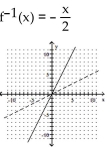
D)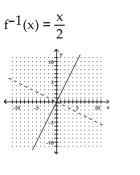
axes.

A)

B)

C)

D)


Unlock Deck
Unlock for access to all 229 flashcards in this deck.
Unlock Deck
k this deck
34
Determine whether the function is a one-to-one function.

A) Yes
B) No

A) Yes
B) No

Unlock Deck
Unlock for access to all 229 flashcards in this deck.
Unlock Deck
k this deck
35
Determine whether the given function is one-to-one. If it is one-to-one, find its inverse function.
f(x) = 4x
A)
B)
C)
D) not a one-to-one function
f(x) = 4x
A)

B)

C)

D) not a one-to-one function

Unlock Deck
Unlock for access to all 229 flashcards in this deck.
Unlock Deck
k this deck
36
A one-to-one function f is given. Find f-1(x) and graph f(x) with a solid line and f-1(x) with a dotted line on the same
axes.
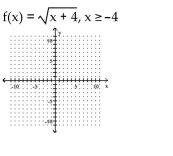
A)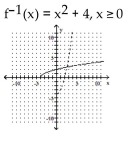
B)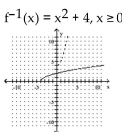 0
0 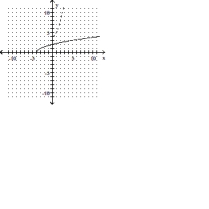
C)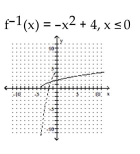
D)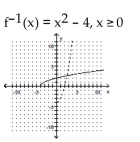
axes.

A)

B)
 0
0 
C)

D)


Unlock Deck
Unlock for access to all 229 flashcards in this deck.
Unlock Deck
k this deck
37
Determine whether the given function is one-to-one. If it is one-to-one, find its inverse function.
f(x) = 6x + 6
A)
B)
C)
D) not a one-to-one function
f(x) = 6x + 6
A)

B)

C)

D) not a one-to-one function

Unlock Deck
Unlock for access to all 229 flashcards in this deck.
Unlock Deck
k this deck
38
Determine whether the given function is one-to-one. If it is one-to-one, find its inverse function.

A)
B)
C)
D) not a one-to-one function

A)

B)

C)

D) not a one-to-one function

Unlock Deck
Unlock for access to all 229 flashcards in this deck.
Unlock Deck
k this deck
39
Determine whether the given function is one-to-one. If it is one-to-one, find its inverse function.
f(x) = x3 + 6
A)
B)
C)
D) not a one-to-one function
f(x) = x3 + 6
A)

B)

C)

D) not a one-to-one function

Unlock Deck
Unlock for access to all 229 flashcards in this deck.
Unlock Deck
k this deck
40
Determine whether the function is a one-to-one function.

A) Yes
B) No

A) Yes
B) No

Unlock Deck
Unlock for access to all 229 flashcards in this deck.
Unlock Deck
k this deck
41
Graph the function.
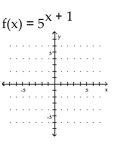
A)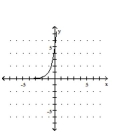
B)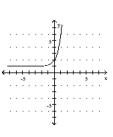
C)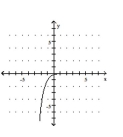
D)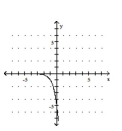

A)

B)

C)

D)


Unlock Deck
Unlock for access to all 229 flashcards in this deck.
Unlock Deck
k this deck
42
Solve the problem.
Austin invested $12,000 in an account at 11% compounded quarterly. Find the amount in Austin's account after a period of 3 years.
A) $4617.41
B) $16,172.66
C) $16,411.57
D) $16,617.41
Austin invested $12,000 in an account at 11% compounded quarterly. Find the amount in Austin's account after a period of 3 years.
A) $4617.41
B) $16,172.66
C) $16,411.57
D) $16,617.41

Unlock Deck
Unlock for access to all 229 flashcards in this deck.
Unlock Deck
k this deck
43
Graph the function.
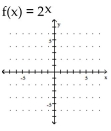
A)
B)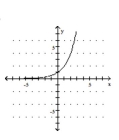
C)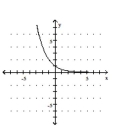
D)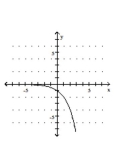

A)

B)

C)

D)


Unlock Deck
Unlock for access to all 229 flashcards in this deck.
Unlock Deck
k this deck
44
Graph the function.
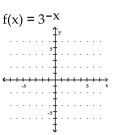
A)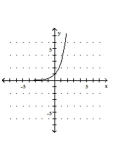
B)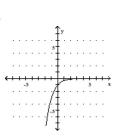
C)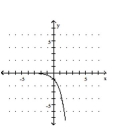
D)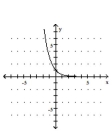

A)

B)

C)

D)


Unlock Deck
Unlock for access to all 229 flashcards in this deck.
Unlock Deck
k this deck
45
Graph the function.
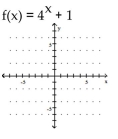
A)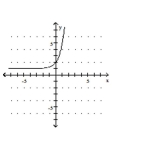
B)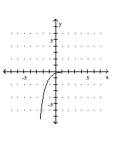
C)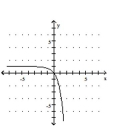
D)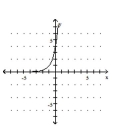

A)

B)

C)

D)


Unlock Deck
Unlock for access to all 229 flashcards in this deck.
Unlock Deck
k this deck
46
Graph the function.
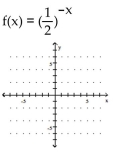
A)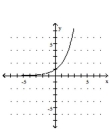
B)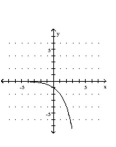
C)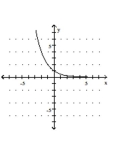
D)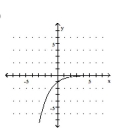

A)

B)

C)

D)


Unlock Deck
Unlock for access to all 229 flashcards in this deck.
Unlock Deck
k this deck
47
Graph the function.
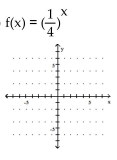
A)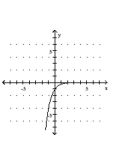
B)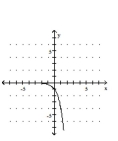
C)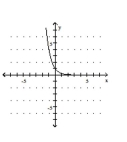
D)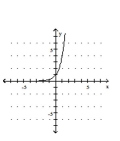

A)

B)

C)

D)


Unlock Deck
Unlock for access to all 229 flashcards in this deck.
Unlock Deck
k this deck
48
Determine whether the given functions are inverses of each other.

A) Yes
B) No

A) Yes
B) No

Unlock Deck
Unlock for access to all 229 flashcards in this deck.
Unlock Deck
k this deck
49
Graph the function.
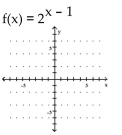
A)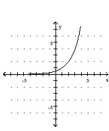
B)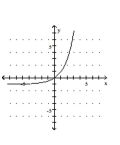
C)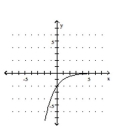
D)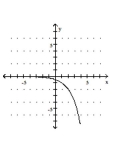

A)

B)

C)

D)


Unlock Deck
Unlock for access to all 229 flashcards in this deck.
Unlock Deck
k this deck
50
Determine whether the given functions are inverses of each other.

A) Yes
B) No

A) Yes
B) No

Unlock Deck
Unlock for access to all 229 flashcards in this deck.
Unlock Deck
k this deck
51
Determine whether the given functions are inverses of each other.
f(x) = 4x,
A) Yes
B) No
f(x) = 4x,

A) Yes
B) No

Unlock Deck
Unlock for access to all 229 flashcards in this deck.
Unlock Deck
k this deck
52
Solve the problem.
Two bacteria are placed in a petri dish. The population will double every day. The formula for the number of bacteria in the dish on day t is where t is the number of days after the two bacteria are placed in the dish. How many bacteria are in the dish six
where t is the number of days after the two bacteria are placed in the dish. How many bacteria are in the dish six
Days after the two bacteria are placed in the dish?
A) 128
B) 72
C) 10
D) 24
Two bacteria are placed in a petri dish. The population will double every day. The formula for the number of bacteria in the dish on day t is
 where t is the number of days after the two bacteria are placed in the dish. How many bacteria are in the dish six
where t is the number of days after the two bacteria are placed in the dish. How many bacteria are in the dish sixDays after the two bacteria are placed in the dish?
A) 128
B) 72
C) 10
D) 24

Unlock Deck
Unlock for access to all 229 flashcards in this deck.
Unlock Deck
k this deck
53
Determine whether the given functions are inverses of each other.

A) Yes
B) No

A) Yes
B) No

Unlock Deck
Unlock for access to all 229 flashcards in this deck.
Unlock Deck
k this deck
54
Graph the function.
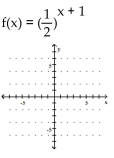
A)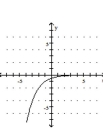
B)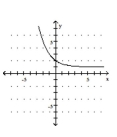
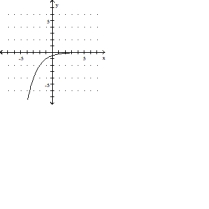
C)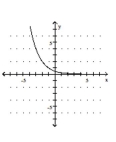
D)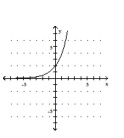

A)

B)


C)

D)


Unlock Deck
Unlock for access to all 229 flashcards in this deck.
Unlock Deck
k this deck
55
Determine whether the given functions are inverses of each other.

A) Yes
B) No

A) Yes
B) No

Unlock Deck
Unlock for access to all 229 flashcards in this deck.
Unlock Deck
k this deck
56
A one-to-one function f is given. Find f-1(x) and graph f(x) with a solid line and f-1(x) with a dotted line on the same
axes.
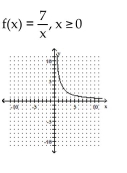
A)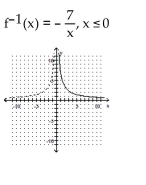
B)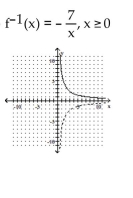
C)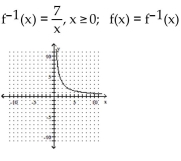
D)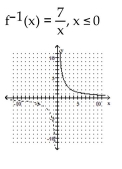
axes.

A)

B)

C)

D)


Unlock Deck
Unlock for access to all 229 flashcards in this deck.
Unlock Deck
k this deck
57
Determine whether the given functions are inverses of each other.

A) Yes
B) No

A) Yes
B) No

Unlock Deck
Unlock for access to all 229 flashcards in this deck.
Unlock Deck
k this deck
58
Determine whether the given functions are inverses of each other.

A) Yes
B) No

A) Yes
B) No

Unlock Deck
Unlock for access to all 229 flashcards in this deck.
Unlock Deck
k this deck
59
Determine whether the given functions are inverses of each other.

A) Yes
B) No

A) Yes
B) No

Unlock Deck
Unlock for access to all 229 flashcards in this deck.
Unlock Deck
k this deck
60
Solve the problem.
The amount of a radioactive substance present, in grams, at time t in months is given by the formula y = 8000(2)-0.2t. Find the number of grams present in 3 years. If necessary, round to three decimal places.
A) 5278.032
B) 5.441
C) 527.803
D) 54.409
The amount of a radioactive substance present, in grams, at time t in months is given by the formula y = 8000(2)-0.2t. Find the number of grams present in 3 years. If necessary, round to three decimal places.
A) 5278.032
B) 5.441
C) 527.803
D) 54.409

Unlock Deck
Unlock for access to all 229 flashcards in this deck.
Unlock Deck
k this deck
61
Write the equation in exponential form.

A)
B)
C)
D)

A)

B)

C)

D)


Unlock Deck
Unlock for access to all 229 flashcards in this deck.
Unlock Deck
k this deck
62
Solve the problem.
The function can be used to determine the milligrams D of a certain drug in a patient's bloodstream h hours after the drug has been given. How many milligrams,rounded to two decimal places, will
can be used to determine the milligrams D of a certain drug in a patient's bloodstream h hours after the drug has been given. How many milligrams,rounded to two decimal places, will
Be present after 7 hours?
A) 82.20 mg
B) 0.95 mg
C) 3.63 mg
D) 0.30 mg
The function
 can be used to determine the milligrams D of a certain drug in a patient's bloodstream h hours after the drug has been given. How many milligrams,rounded to two decimal places, will
can be used to determine the milligrams D of a certain drug in a patient's bloodstream h hours after the drug has been given. How many milligrams,rounded to two decimal places, willBe present after 7 hours?
A) 82.20 mg
B) 0.95 mg
C) 3.63 mg
D) 0.30 mg

Unlock Deck
Unlock for access to all 229 flashcards in this deck.
Unlock Deck
k this deck
63
Write the equation in exponential form.

A)
B)
C)
D)

A)

B)

C)

D)


Unlock Deck
Unlock for access to all 229 flashcards in this deck.
Unlock Deck
k this deck
64
Write the equation in logarithmic form.
9
A)
B)
C)
D)
9

A)

B)

C)

D)


Unlock Deck
Unlock for access to all 229 flashcards in this deck.
Unlock Deck
k this deck
65
Write the equation in logarithmic form.

A)
B)
C)
D)

A)

B)

C)

D)


Unlock Deck
Unlock for access to all 229 flashcards in this deck.
Unlock Deck
k this deck
66
Write the equation in exponential form.

A)
B)
C)
D)

A)

B)

C)

D)


Unlock Deck
Unlock for access to all 229 flashcards in this deck.
Unlock Deck
k this deck
67
Write the equation in logarithmic form.

A)
B)
C)
D)

A)

B)

C)

D)


Unlock Deck
Unlock for access to all 229 flashcards in this deck.
Unlock Deck
k this deck
68
Write the equation in logarithmic form.

A)
B)
C)
D)

A)

B)

C)

D)


Unlock Deck
Unlock for access to all 229 flashcards in this deck.
Unlock Deck
k this deck
69
Solve the problem.
The value V of a car that is t years old can be modeled by . According to the model, what is the value, to the nearest dollar, of a 3 year old car?
. According to the model, what is the value, to the nearest dollar, of a 3 year old car?
A) $13,511
B) $11,214
C) $48,836
D) $4904
The value V of a car that is t years old can be modeled by
 . According to the model, what is the value, to the nearest dollar, of a 3 year old car?
. According to the model, what is the value, to the nearest dollar, of a 3 year old car?A) $13,511
B) $11,214
C) $48,836
D) $4904

Unlock Deck
Unlock for access to all 229 flashcards in this deck.
Unlock Deck
k this deck
70
Solve the problem.
The expected future population of a small town, which currently has 7900 residents, can be approximated by the formula where t is the number of years in the future. Find the expected population of the town 50 years in the future.
where t is the number of years in the future. Find the expected population of the town 50 years in the future.
A) 0
B) 3792
C) 7900
D) 7
The expected future population of a small town, which currently has 7900 residents, can be approximated by the formula
 where t is the number of years in the future. Find the expected population of the town 50 years in the future.
where t is the number of years in the future. Find the expected population of the town 50 years in the future.A) 0
B) 3792
C) 7900
D) 7

Unlock Deck
Unlock for access to all 229 flashcards in this deck.
Unlock Deck
k this deck
71
Write the equation in exponential form.

A)
B)
C)
D)

A)

B)

C)

D)


Unlock Deck
Unlock for access to all 229 flashcards in this deck.
Unlock Deck
k this deck
72
Write the equation in logarithmic form.

A)
B)
C)
D)

A)

B)

C)

D)


Unlock Deck
Unlock for access to all 229 flashcards in this deck.
Unlock Deck
k this deck
73
Use the definition of a logarithm to find an equivalent equation.

A)
B)
C)
D)

A)

B)

C)

D)


Unlock Deck
Unlock for access to all 229 flashcards in this deck.
Unlock Deck
k this deck
74
Write the equation in logarithmic form.

A)
B)
C)
D)

A)

B)

C)

D)


Unlock Deck
Unlock for access to all 229 flashcards in this deck.
Unlock Deck
k this deck
75
Solve the problem.
A sample of 800 g of lead-210 decays to polonium-210 according to the function given by , where t is time in years. What is the amount of the sample, to the nearest gram, after 100 years?
, where t is time in years. What is the amount of the sample, to the nearest gram, after 100 years?
A) 77 g
B) 24 g
C) 19,620 g
D) 33 g
A sample of 800 g of lead-210 decays to polonium-210 according to the function given by
 , where t is time in years. What is the amount of the sample, to the nearest gram, after 100 years?
, where t is time in years. What is the amount of the sample, to the nearest gram, after 100 years?A) 77 g
B) 24 g
C) 19,620 g
D) 33 g

Unlock Deck
Unlock for access to all 229 flashcards in this deck.
Unlock Deck
k this deck
76
Write the equation in logarithmic form.

A)
B)
C)
D)

A)

B)

C)

D)


Unlock Deck
Unlock for access to all 229 flashcards in this deck.
Unlock Deck
k this deck
77
Find the unknown value.

A) 6
B) 2
C) 3
D) 9

A) 6
B) 2
C) 3
D) 9

Unlock Deck
Unlock for access to all 229 flashcards in this deck.
Unlock Deck
k this deck
78
Write the equation in exponential form.

A)
B)
C)
D)

A)

B)

C)

D)


Unlock Deck
Unlock for access to all 229 flashcards in this deck.
Unlock Deck
k this deck
79
Write the equation in logarithmic form.

A)
B)
C)
D)

A)

B)

C)

D)


Unlock Deck
Unlock for access to all 229 flashcards in this deck.
Unlock Deck
k this deck
80
Use the definition of a logarithm to find an equivalent equation.

A)
B)
C)
D)

A)

B)

C)

D)


Unlock Deck
Unlock for access to all 229 flashcards in this deck.
Unlock Deck
k this deck



